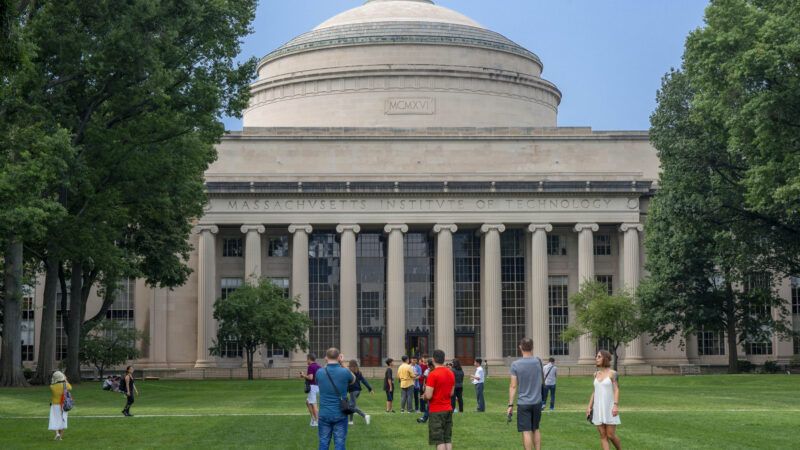MIT Reinstates Standardized Testing Requirements for Admissions
Doing away with standardized testing doesn't help low-income applicants gain entry to elite colleges.

This week, the Massachusetts Institute of Technology (MIT) announced that it would reinstate its SAT/ACT test requirement for applicants. In a departure from the trends set by other elite universities, MIT rolled back its admissions policy, implemented in the 2020–2021 admissions cycle, which made standardized test scores optional. Administrators cited key issues with "holistic" admissions standards, an increasingly popular method of equitably distributing open spots to students regardless of how well they perform on standardized tests.
In a statement explaining the decision, MIT Dean of Admissions and Student Financial Services Stu Schmill noted that MIT's "research shows standardized tests help us better assess the academic preparedness of all applicants, and also help us identify socioeconomically disadvantaged students who lack access to advanced coursework or other enrichment opportunities that would otherwise demonstrate their readiness for MIT."
Without an objective measure like a standardized test, low-income students—who may not have equal access to other pieces of the holistic pie, such as a plethora of Advanced Placement (A.P.) classes or numerous extracurriculars—have a harder time proving that they are academically prepared for an MIT education. A move that was intended to increase diversity and help low-income students, as it turns out, mostly helps low-scoring wealthy students—and makes it harder to identify talented yet underprivileged applicants.
MIT now distinguishes itself from other elite universities, a spate of which have removed their SAT and ACT requirements in recent years, primarily citing COVID-19 and diversity-related justifications for the policy change.
The original logic of such policies is based on the idea that SAT and ACT scores correlate strongly with income, which suggests that students from poorer households are denied admission to competitive schools solely because they can't afford to ace the SATs.
However, omitting standardized test scores makes all applicants reliant on application materials that correlate even more highly with income, such as admissions essays. A 2021 Stanford study found that essays are actually more strongly correlated with household income than SAT scores. Thus, by omitting one income-correlated metric, one that is even more closely related to income takes prominence.
While wealthy parents can pay for test prep, they can't take a standardized test for their children (well, almost never). However, with essay coaches and college counselors at their disposal, many wealthy students' college essays can be manicured to fit exactly what schools are looking for.
Another factor that few holistic admissions advocates acknowledge is that family wealth correlates with college readiness. This is not because applicants from middle, upper-middle, and upper-income households are more worthy of higher education, but because their family wealth has allowed them to purchase tutoring and test prep services, if not property zoned for an elite public school, as well as extracurricular opportunities.
Attempting to shuffle around the factors used to measure college readiness will never close the readiness gap between low- and high-income students. The narrative pushed by some testing critics is that there is no actual academic skill gap between low- and high-income students, and that it is simply the tests that create this illusion (with some even claiming standardized test questions are too culturally biased for poor students of color to understand). However, as uncomfortable as it may make us, a student attending a poorly performing school with few A.P. classes and a student who attends a school with a rigorous college-prep curriculum will likely end up with vastly different skill sets. In short, the issue is the massive disparity between what American primary and secondary schools can do for their students, not the ways in which we measure the very real results of that disparity.
MIT's turn toward standardized tests will hopefully encourage other universities to reinstate their own standardized test requirements—a move that will actually help ambitious low-income students prove their exceptional talent, rather than making it harder to identify.


Show Comments (57)